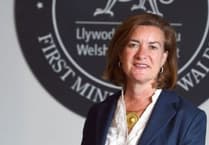Bosses at Wales’ environmental body, Natural Resources Wales, have refuted claims that the organization is not fit for purpose.
From the closure of Bwlch Nant yr Arian near Ponterwyd, Coed y Brenin in Ganllwyd and Ynyslas visitor centres in March this year, incidents of pollution in our rivers and an uplaid tax bill, questions are being asked about how the organisation is run.
An investigation by ITV Wales this week into water quality discovered that during 2024, just 36% of pollution incidents categorised as "water" were attended by NRW.
That number could be on a downward trajectory, as from July 2025, NRW said it was moving to a “more risk-based approach to incident response,” meaning some lower-risk pollution incidents may not be attended or receive an immediate response.
Natural Resources Wales said they take their "responsibilities for protecting the environment very seriously" and added that "while we acknowledge that there is still a long way to go, real progress has been made in improving the quality of our water, land and air over the last 30 years."
The decision to close the three visitor centres was made as part of a bid to save £12 million from the public body’s budget and the three centres spent the summer with closed doors.
Speaking earlier this year when quizzed by Senedd members over the state of NRW and the closure of the centres, Sir David Henshaw, Chair of NRW, smirked and said they ‘weren’t doing massive business’, something campaigners refute.
He added: “For us it’s a difficult decision but as part of the budget challenge, this is a lower priority.
“These forests and places are not being closed. Let’s be clear about that.
“What is being looked at is the closures of café facilities and shops which actually cost us around £1 million a year and we are looking for other partners to take those facilities over.
“We had to wait for some legal reasons to stop the facilities and start the tender operations.
“One has to say we weren’t doing massive business in these shops and cafes.
“They were a big loss maker.”
Speaking on the state of NRW’s finances at the Senedd’s climate committee, he added: “We can’t carry on as we are.”
But he stressed: “Our duty is to face the challenge and actually deal with it,” adding: “It’s going to be a rough old 12 months or so.”
Last year the Welsh Government had to bail NRW out, paying £19 million to HMRC to settle a tax bill.
Coupled with that, Ceredigion Preseli was named Top of the Poops in April this year for the most hours of sewage spilling into our waterways in 2024 out of all of England and Wales.
A total of 94,836 hours of sewage overflow into rivers, streams and seas was recorded in Ceredigion Preseli in 2024, with Caerfyrddin a close second with 88,840 hours, Gwynedd’s Dwyfor Meirionnydd taking third place with 88,682 hours and Mid and South Pembrokeshire coming seventh with 58,148 hours of overflow.
The River Teifi was also named the worst Welsh river and fifth in the UK, receiving 22,288 hours of overflow.
MPs Ben Lake for Ceredigion, Ann Davies for Caerfyrddin and Liz Saville Roberts for Dwyfor Meirionnydd said: “These shocking sewage overflow figures pose a serious threat to public health, the environment, and the wellbeing of our communities.
“It is unacceptable that three of the worst-affected areas are in Wales.
“As Plaid Cymru MPs representing the three worst-hit constituencies across both Wales and England, we have written to Dŵr Cymru for an urgent explanation of why pollution levels in Ceredigion Preseli, Caerfyrddin, and Dwyfor Meirionnydd are particularly severe.
“Our constituents deserve absolute clarity on what urgent action is being taken to fix this appalling situation.”
There is hope that all three visitor centres could reopen by next summer, with Ynyslas being taken over by Borth Community Hub.
Elsie Grace, NRW’s Head of Sustainable Commercial Development, said: “We are very pleased to be working with Borth Community Hub. We recognise the great work they do in the community, providing a range of services which help support people.
“Choosing a partner who will provide long-term, sustainable health and well-being benefits to the area was at the forefront of our decision making.”
A tender process for Bwlch Nant yr Arian and Coed y Brenin is expected to begin in November, with NRW saying it hopes to award contracts by the end of April.
NRW said: "Following a period of preparation work, legal checks, internal governance and subject to final approval, it is hoped the marketing exercise can be formally launched in November 2025 with the aim of awarding contracts by the end of April 2026.
"We will be focusing on finding long-term, sustainable partners who benefit local communities and enhance tourism.
"The exercise will be managed through the Sell2Wales procurement portal set up by the Welsh Government and interested parties can sign up to the platform in advance."
Community groups such as the charitable organisation behind Aberystwyth Cliff Railway and Caru Coed y Brenin have expressed interest in running the sites local to them.
A spokesperson for Natural Resources Wales said: “We take our responsibilities for protecting the environment very seriously.
“While we acknowledge that there is still a long way to go, real progress has been made in improving the quality of our water, land and air over the last 30 years. Our colleagues have always, and continue to, play a pivotal role in tackling these issues. They always go the extra mile for the people and places we serve, and ensuring their well-being in the face of constant scrutiny and criticism is of the utmost importance to us.
“As the challenges of a growing population and the climate and nature emergencies intensify, so does our commitment to keeping people and nature safe from the impacts of environmental incidents, and to enforce the rules that ensure industries across Wales are robustly regulated to minimise pollution.
“But like all public bodies, our resources are finite and we have to make informed decisions about how and where to focus our efforts to protect lives, livelihoods and the environment.
“NRW manages a £300 million budget across a huge remit – and that scale demands strong leadership. We will continue to be astute and innovative in how we use the resources we do have, and prioritise those actions to ensure they have the best outcomes for people and for nature, and that they deliver the improvements to our environment that we all want to see.”
When quizzed this week, NRW’s acting CEO, Ceri Davies, said: “The people of Wales need to help us to ensure the environment is as good as we can make it.
“We are not happy with the standard of our river water quality at the moment, albeit that it is improving.
“It makes me angry and sad that in this day in age that our river water quality and sea are not at the standard we want them to be.
“We’re not overstretched as an organisation. We do have the resources we need.”
Asked whether the organisation was fit for purpose, she added: “I would dispute that. I think the organisation has come a huge way since its formation, bringing together all the environmental responsibilities into one organisation.”

-a-joyful-and-inclusive-c.jpeg?width=209&height=140&crop=209:145,smart&quality=75)



Comments
This article has no comments yet. Be the first to leave a comment.